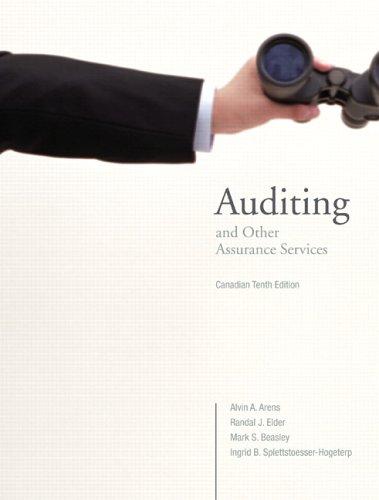Question
A parent company acquired its 70% interest in its subsidiary on January 1, 2014. On the acquisition date, the total fair value of the controlling
A parent company acquired its 70% interest in its subsidiary on January 1, 2014. On the acquisition date, the total fair value of the controlling interest and the noncontrolling interest was $455,000 in excess of the book value of the subsidiarys Stockholders Equity. All of that excess was allocated to a Royalty Agreement, which had a zero book value in the subsidiarys financial statements (i.e., there is no Goodwill). The Royalty Agreement has a 7 year estimated remaining economic life on the acquisition date. Both companies use straight line amortization, with no terminal value. In January 2017, the subsidiary sold Equipment to the parent for a cash price of $325,000. The subsidiary acquired the equipment at a cost of $624,000 and depreciated the equipment over its 10-year useful life using the straight-line method (no salvage value). The subsidiary had depreciated the equipment for 6 years at the time of sale. The parent retained the depreciation policy of the subsidiary and depreciated the equipment over its remaining 4 year useful life. Following are pre-consolidation financial statements of the parent and its subsidiary for the year ended December 31, 2019. The parent uses the equity method to account for its Equity Investment. Parent Subsidiary Parent Subsidiary Income statement: Balance sheet: Sales $4,420,000 $1,170,000 Assets Cost of goods sold (3,120,000) (650,000) Cash $805,350 $325,000 Gross profit 1,300,000 520,000 Accounts receivable 689,000 546,000 Income (loss) from subsidiary 104,195 Inventory 1,170,000 715,000 Operating expenses (678,600) (325,000) PPE, net 4,550,000 1,300,000 Net income $725,595 $195,000 Equity investment 551,005 $7,765,355 $2,886,000 Statement of retained earnings: BOY retained earnings $2,307,760 $260,000 Liabilities and stockholders equity Net income 725,595 195,000 Accounts payable $442,000 $325,000 Other current liabilities 520,000 390,000 Dividends (130,000) (39,000) Long-term liabilities 1,950,000 1,430,000 EOY retained earnings $2,903,355 $416,000 Common stock 260,000 130,000 APIC 1,690,000 195,000 Retained earnings 2,903,355 416,000 $7,765,355 $2,886,000 a. Disaggregate and document the activity for the 100% Acquisition Accounting Premium (AAP), the controlling interest AAP and the noncontrolling interest AAP. Do no enter any negative answers in part a. Unamortized Unamortized Unamortized Unamortized Unamortized Unamortized Unamortized AAP 2014 AAP 2015 AAP 2016 AAP 2017 AAP 2018 AAP 2019 AAP 1/1/2014 Amortization 1/1/2015 Amortization 1/1/2016 Amortization 1/1/2017 Amortization 1/1/2018 Amortization 1/1/2019 Amortization 1/1/2020 Royalty agreement Answer 455000 Answer 65000 Answer 390000 Answer 65000 Answer 325000 Answer 65000 Answer 260000 Answer 65000 Answer 195000 Answer 65000 Answer 130000 Answer 65000 Answer 65000 Controlling interest: Royalty agreement Answer 318500 Answer 45500 Answer 273000 Answer 45500 Answer 227500 Answer 45500 Answer 182000 Answer 45500 Answer 136500 Answer 45500 Answer 91000 Answer 45500 Answer 45500 Noncontrolling interest: Royalty agreement Answer 136500 Answer 19500 Answer 117000 Answer 19500 Answer 97500 Answer 19500 Answer 78000 Answer 19500 Answer 58500 Answer 19500 Answer 39000 Answer 19500 Answer 19500 b. Calculate and organize the profits and losses on intercompany transactions and balances. Use negative signs with answers that are reductions. Downstream Upstream Answer Answer Answer Less: Answer Answer Answer Answer Answer Answer c. Compute the pre-consolidation Equity Investment account beginning and ending balances starting with the stockholders equity of the subsidiary. Use negative signs with answers that are reductions. Equity investment at 1/1/19: Common stock Answer 91000 APIC Answer 136500 Retained earnings Answer 182000 Answer Unamortized AAP Answer 91000 Less: Answer 70% of upstream deferred intercompany profits Answer -26390 Answer 474110 Equity investment at 12/31/19: Common stock Answer 91000 APIC Answer 136500 Retained earnings Answer 291200 Answer Unamortized AAP Answer 45500 Less: Answer 70% of upstream deferred intercompany profits Answer -13195 Answer 551005 d. Reconstruct the activity in the parents pre-consolidation Equity Investment T-account for the year of consolidation. Equity Investment Balance at 1/1/19 Answer Answer Net income Answer Answer Dividends Answer Answer Answer Answer Balance at 12/31/19 Answer Answer e. Independently compute the owners equity attributable to the noncontrolling interest beginning and ending balances starting with the owners equity of the subsidiary. Use negative signs with answers that are reductions. Noncontrolling interest at 1/1/19: Common stock Answer APIC Answer Retained earnings Answer Answer Answer Less: Answer Answer Answer Noncontrolling interest at 12/31/19: Common stock Answer APIC Answer Retained earnings Answer Answer Answer Less: Answer Answer Answer f. Independently calculate consolidated net income, controlling interest net income and noncontrolling interest net income. Use negative signs with answers that are reductions. Consolidated: Parent's stand-alone net income Answer Subsidiary's stand-alone net income Answer Plus: Answer Answer Less: Answer Answer Subsidiary's adjusted stand-alone net income Answer Consolidated net income Answer Parent: Parent's stand-alone net income Answer 70% Subsidiary's stand-alone net income Answer Plus: Answer Answer Less: Answer Answer 70% of subsidiary's stand-alone net income Answer Consolidated net income attributable to the parent Answer Subsidiary: 30% of subsidiary's stand-alone net income Answer Plus: Answer Answer Less: Answer Answer Answer g. Complete the consolidating entries according to the C-E-A-D-I sequence. Consolidation Worksheet Description Debit Credit [C] Equity income Answer Answer Answer Answer Answer Dividends Answer Answer Equity investment Answer Answer Answer Answer Answer [E] Common stock Answer Answer APIC Answer Answer Answer Answer Answer Equity investment Answer Answer Answer Answer Answer [A] Answer Answer Answer Equity investment Answer Answer Answer Answer Answer [D] Operating expenses Answer Answer Answer Answer Answer [Igain] Equity investment Answer Answer Answer Answer Answer Answer Answer Answer [Idep] Answer Answer Answer Answer
Step by Step Solution
There are 3 Steps involved in it
Step: 1

Get Instant Access to Expert-Tailored Solutions
See step-by-step solutions with expert insights and AI powered tools for academic success
Step: 2

Step: 3

Ace Your Homework with AI
Get the answers you need in no time with our AI-driven, step-by-step assistance
Get Started


